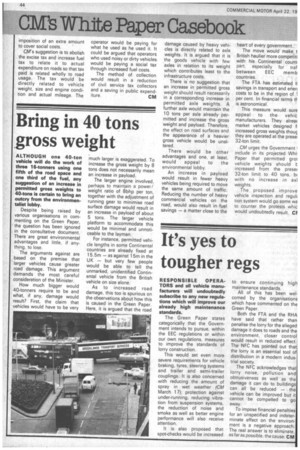It's yes to tougher regs
Page 46

If you've noticed an error in this article please click here to report it so we can fix it.
RESPONSIBLE OPERATORS and all vehicle manufacturers will undoubtedly subscribe to any new regulations which will improve our already high maintenance standards.
The Green Paper states categorically that the Government intends to pursue, within the EEC regulations or within our own regulations, measures to improve the standards of lorry construction.
This would set even more severe requirements for vehicle braking, tyres, steering systems and trailer and semi-trailer couplings. It is also concerned with reducing the amount of spray in wet weather (CM March 17); protection against under-running, reducing vibration from suspension systems, the reduction of noise and smoke as well as better engine performance will also receive attention.
It is also proposed that spot-checks would be increased to ensure continuing high maintenance standards.
All of this has been welcomed by the organisations which have commented on the Green Paper.
Both the FTA and the RHA have said that rather than penalise the lorry for the alleged damage it does to roads and the environment, closer control would result in reduced effect. The NFC has pointed out that the lorry is an essential tool of distribution in a modern industrial society.
The NFC acknowledges that lorry noise, pollution and obtrusiveness as well as the damage it can do to buildings can all be reduced — the vehicle can be improved but it cannot be compelled to go away.
To impose financial penalties for an unspecified and indeterminate effect on the environment is a negative approach. The real answer is to eliminate, as far as possible, the cause. CM




















































































